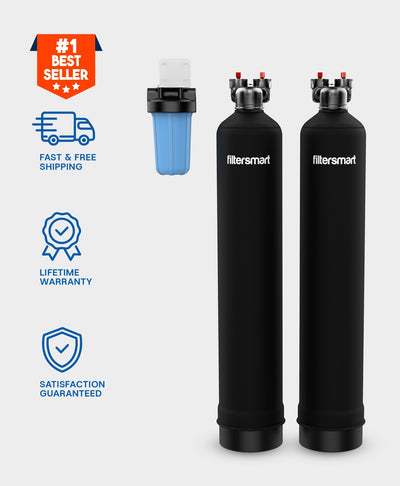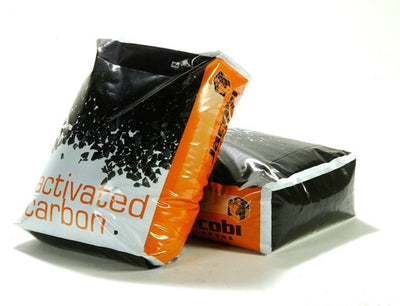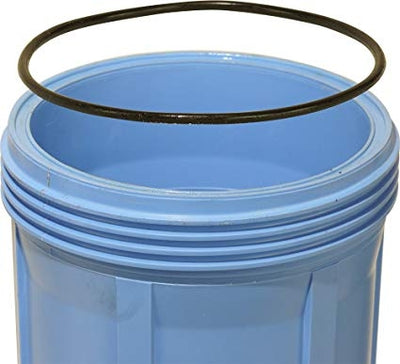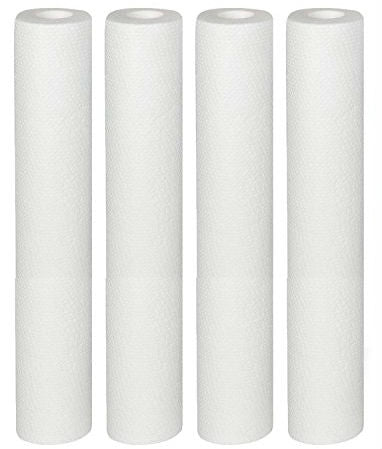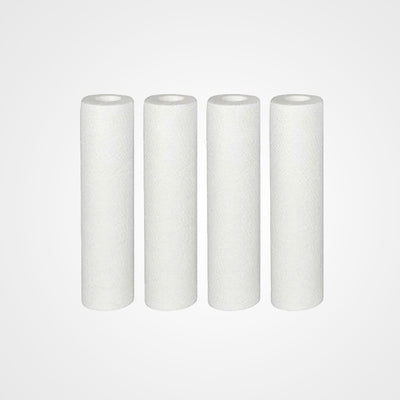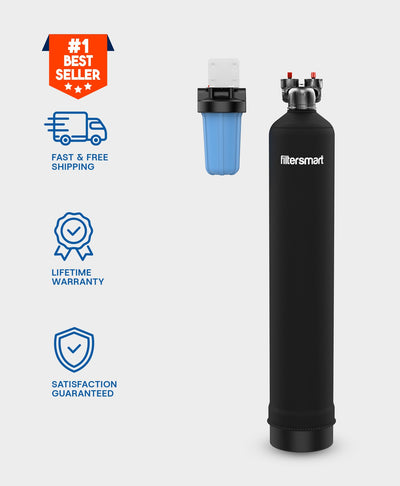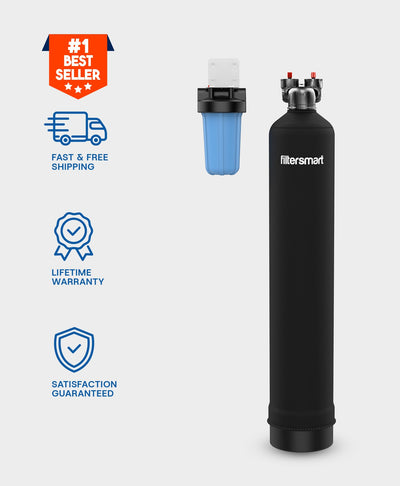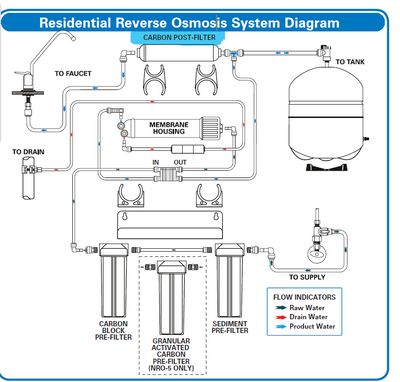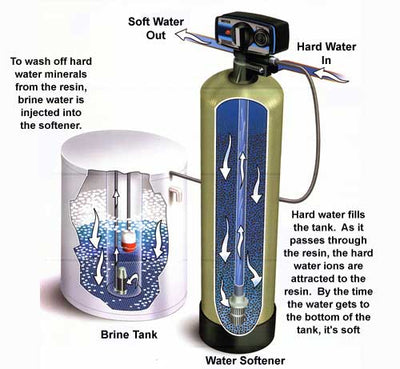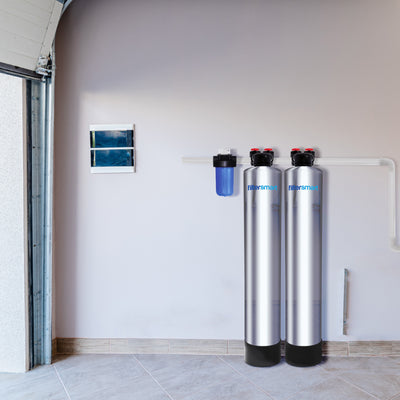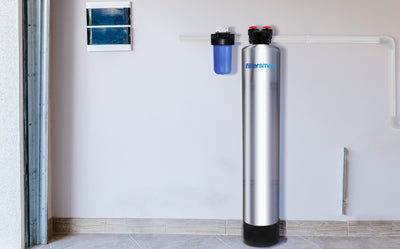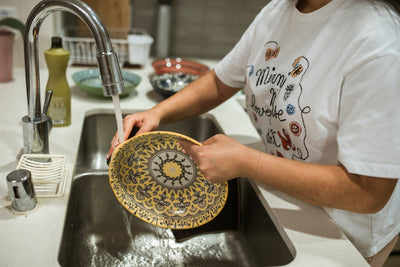Looking for a NuvoH20 Citric Water Softener review? You came to the right place. We'll teach you all about citric water softening to help you better evaluate whether or not the NuvoH20 is a good system for you.
Is it effective? Is it a good value for the money? Should you buy it or not?
In short, our answer is probably not.
There’s an almost complete lack of evidence regarding the efficacy of citric acid softening. On paper, citric acid softeningshouldwork just fine, but in actuality, there are a lot of things that can go wrong. Not only do you have to worry about the cost of the system itself, but you also have to worry about citric acid corroding your copper pipes and generating unnecessary, unhealthy byproducts.
First, let’s go over how the NuvoH20 Citric Acid Water Softener works before diving into what people have to say about it.
NuvoH20 Citric Water Softener: How Does It Work?
If you’re a regular reader of the FilterSmart blog, or if you just know a fair bit about water softeners, you already understand howdifferent types of water softeners work.
One process that we haven’t talked about, though, is chelation. When systems use citric acid to soften water, that’s called chelation -- and it isn’t all that different from ion exchange.
We already know that, during ion exchange, hardness ions like magnesium and calcium bind to a negatively charged zeolite. Then, during the process of regeneration, a strong brine solution is run through the zeolites in order to wash off the magnesium and calcium into a discharge line.
The idea behind chelation is actually fairly similar, except there’s no discharge. The NuvoH20 Citric Water Softener works by slowly metering citric acid into your water so that the hardness ions bind with the citric acid instead of clinging to surfaces.
NuvoH20 Citric Water Softener Review: Drawbacks
What are the drawbacks to using citric acid to soften water? Well, the main problem involves careful metering of the citric acid into your water supply. Too little citric acid, and you’ll only have a slight reduction in your hard water problems. Too much citric acid, and it’s going to negatively interact with the cleaning agents -- making your hard water problem into more of an acid problem.
So not only will the metering of the citric acid need to be fairly precise, but also you’ll need to hire someone to make sure that the metering is precise. That very likely means incurring higher installation costs.
Lack of Evidence Concerning Citric Acid Softening (Penn State University Recommends Staying Away From Citric Acid Water Softeners)
Not only will the citric acid need to perfectly match the hardness of your water in order for systems like the NuvoH20 Citric Water Softener to be effective, but there’s also a lack of definitive data confirming that they’re even effective in the first place.
Template assisted crystallization has independent third-party studies confirming its efficacy in reducing limescale production.
Citric acid softening is that it’s running into the same issue that template-assisted crystallization used to run into: since thepresence of hardness ions remains unaffected, when the water is tested, there’s no real reduction in hard water (whereas in ion exchange, those hardness ions are literally replaced with sodium ions). Template assisted crystallization has been proven to change the nucleation sites of those hardness ions, but there are no similar studies confirming the same for citric acid softening.
For instance, because of the lack of data on citric acid softening,Penn State doesn’t recommend their use at all: “non-traditional softening units using magnets, electronic charges, orcitric acid to remove hardness have shown mixed results of effectiveness and are not generally recommended.”
Any NuvoH20 Citric Water Softener review should acknowledge that citric water softening isn't the most effective softening method, to say the least.
Additional Drawback to Citric Water Softening: The Cost of the Filter
We recently wrote an article on the costs of the average water softener, but the maintenance costs for both template assisted crystallization softeners and ion exchange softeners don’t even come close to those associated with citric acid softeners.
The average cost of a citric acid water softener filter is $800, and it must be replaced annually. This is about on par with buying a new mid-range TAC softener every year or so. What’s worse: the NuvoH20 Citric Water Softener needs to be replaced about once every three months.
With all that said, that doesn’t mean that the NuvoH20 Citric Water Softener is a terrible product in and of itself. Let’s see what other people have to say about it.
NuvoH20 Citric Water Softener Reviews from Amazon Customers
Next, we’re going to collect a number of reviews from various outlets and citric acid water softener users and compile them here. There are three main products offered by NuvoH20:
-
The NuvoH20 Studio System (which services 1 person)
-
The NuvoH20 Home System (which services 2-3 people)
-
The NuvoH20 Manor Studio (which services 4+ people)
Their most popular product on Amazon, a new model called the “Nuvo H2O Dphb-a Home Water Softener System” has 327 reviews. Of those 327 reviews,74 have one star.
Many people are angry with the quality and cost offered by NuvoH20 systems. Here’s a short sampling of what they’re saying. Keep in mind these are all actual verified Amazon buyers. At times we used ellipses in order to condense the reviews and make them more readable, but we never changed the actual message of the reviewer. You can always read the full reviews for yourself, if you’d like.
NuvoH20 Malfunctions Due to Hot Weather, and the Warranty Doesn’t Cover It
“VERY VERY VERY disappointed! Do not waste your hard earned money on this system! I purchased this system about a year ago. It cost me almost $1400 at the time , with the cost of a licensed plumber for installation. It seemed to work great until summer hit this year... I contacted Nuvo H2O to see what they could do about warranties on it. I sent pictures, and they told me they wouldn’t warranty it do to the Heat.”
Since this reviewer lived in Arizona, he recouped none of his $1400 investment in the product -- despite the fact that it wasn’t functional.
Citric Acid Corrodes Copper Pipes, Causing Bright Blue Water
“This system has been installed in our home for just one year and for the first 6 months it seemed to work ok BUT.... we now have BRIGHT BLUE WATER coming from all our taps and two toilets. Buyers beware, we would definitely NOT recommend this product.”
Why does this happen? Well, citric acid is exceptional at cleaning copper. That’s why baristas occasionally use it to descale their equipment. Citric acid usually isn’t strong enough to corrode copper, but if the concentration of citric acid is high enough, it’s certainly possible. This is a problem thatshould go away in time. But, as you can see with certain reviews, sometimes the concentration of citric acid simply becomes too great, and it becomes a much bigger problem than it should be.
Anecdotal Evidence of Ineffective Softening Due to Citric Acid Softening
Worst of all, plenty of reviewers have found that, after installing their NuvoH20 Citric Acid Softeners, they don’t work at all. Then they have to spend a lot of money having their systems installed and uninstalled.
“I purchased a Nuvo H2O two years ago...
I spoke with a salesperson at the company and they assured me it would work and that the cost would be minimal to have it installed (I was told approximately $100 to $150).
Everything sounded great, so I spent over a thousand dollars to buy the system and a couple of additional filters.
I received it and quickly found out that some of what I had been told was wrong. The actual cost to install the system was approximately $600… All in all, I spent approximately $1,000 in total to have my system installed and then uninstalled.”
NuvoH20 Citric Water Softener Review: Conclusion
The list of possible issues with citric acid softening is extensive.
First off, there’s the lack of evidence confirming their efficacy. Penn State University recommends that you stay away from citric acid softening because of this, saying, “non-traditional softening systems using… citric acid to remove hardness have shown mixed results of effectiveness and are not generally recommended.”
Next, there’s the cost. Many reviewers report paying around $1400 total to have their NuvoH20 system installed. Despite promises from the salespeople confirming that installing the systems would cost $100 or less, it often cost $500 or more.
Additionally, there’s some evidence from reviewers that citric acid softening is ineffective. A lot of them noticed no difference in their hard water at all.
Finally, there’s the possibility that citric acid corrodes your copper pipes, which eventually will cause more damage than good (not to mention the bright blue chlorine-like look of the water).
Questions? Concerns? Feel free to get in touch:
Call us: 866.455.9989
Email us: sales@filtersmart.com








